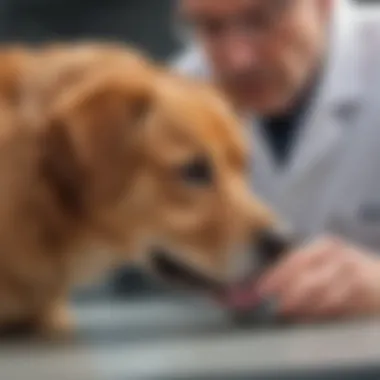Understanding Vomiting and Diarrhea Causes in Dogs


Intro
Vomiting and diarrhea are not just common dog issues; they can indicate deeper health problems. For a dog owner, understanding the causes of these symptoms is crucial. It affects your dog’s well-being and guides you in seeking necessary help. This section delves into the primary factors that lead to these disturbances, focusing on potential dietary triggers, infections, and other health concerns. Pet owners must grasp these elements to ensure their canine companions are healthy and happy.
Understanding Your Pet
Breed Traits
Different dog breeds may have varying predispositions to certain health issues. Small breeds like Dachshunds or Chihuahuas may be more prone to certain digestion issues compared to larger breeds like Labrador Retrievers. Knowing your dog's breed traits helps in understanding their unique needs and vulnerabilities.
Common Temperaments
The temperament of your dog can also play a role in their digestion. For example, anxious dogs may eat their food too quickly, leading to vomiting. Recognizing these behaviors aids in controlling them and ensuring your dog eats slowly and calmly.
Special Needs
Some dogs have special dietary requirements due to allergies or pre-existing conditions. It's critical to be aware of these unique needs to avoid foods that could trigger vomiting or diarrhea.
Pet Care Essentials
Nutrition and Feeding Guidelines
Proper nutrition is foundational in dog health. High-quality dog food plays a significant role in preventing gastrointestinal issues. It's wise to consult with a vet for advice on the best dietary options for your dog.
Grooming Tips and Techniques
Regular grooming also contributes to overall pet health. Keeping your dog clean minimizes the risk of health issues and helps in early detection of potential problems.
Health and Wellness
Routine check-ups with a veterinarian ensure your dog stays healthy. Vaccinations, parasite control, and regular health screenings are necessary for early identification of health problems.
Training and Behavior
Basic Training Techniques
Proper training can mitigate behavioral issues that may arise, like anxiety or excitement, which can lead to gastrointestinal upsets.
Behavioral Problems and Solutions
Identifying behavioral problems early is important. A stressed dog may develop health issues. Solutions may involve training or counseling.
Mental Stimulation Activities
Engaging your dog mentally can reduce anxiety. Activities like puzzle toys can keep them occupied, potentially lessening the chances of digestive disturbances.
Engaging with Your Pet
Interactive Games and Toys
Interactive play helps strengthen the bond with your pet and also offers a distraction from stressors. This is vital for their mental and physical well-being.
Safe Outdoor Activities
Outdoor adventures provide exercise and excitement for dogs. These activities also help with digestion as they promote a healthy lifestyle.
Family-Friendly Pet Interactions
Encouraging positive family interactions supports a dog's emotional health. A happy dog is often less prone to vomit or have diarrhea.
Pet Adoption and Integration
Choosing the Right Pet for Your Lifestyle
When considering pet adoption, review your lifestyle. Every breed has different needs and can require a different level of care and attention.


Preparing Your Home for a New Pet
A prepared home for a new pet involves removing dangerous items and creating a safe space. This prevents stressors that could lead to health issues.
Tips for Smooth Prologue
If you have other pets, introduce them slowly. A calm introduction process can prevent anxiety-related health issues.
Understanding the symptoms of your pet's health can ensure timely care, avoiding complications.
In summary, being mindful of the causes of vomiting and diarrhea in dogs helps in timely intervention, thereby ensuring a healthier life for your canine friends.
Prolusion
Vomiting and diarrhea in dogs are common symptoms that many pet owners encounter. Understanding the causes behind these issues is essential for effective management and improved health outcomes. Ignoring these signs can lead to more severe complications. Thus, it is imperative to grasp the reason for such distress in your canine companion.
The significance of exploring vomiting and diarrhea lies in identifying the underlying factors that contribute to these conditions. Various elements, ranging from dietary issues to infectious agents, can play a role. A well-informed pet owner can respond appropriately to symptoms when they arise. This not only alleviates the immediate discomfort of the dog but also ensures a holistic approach to its health.
In this article, we will examine different causes of vomiting and diarrhea. Important considerations will include the dog's diet, exposure to environments, and health conditions affecting the digestive system. By shedding light on these elements, we aim to equip readers with knowledge that can aid in making informed decisions for their pet's care. Would not it be beneficial to know when to seek veterinary help? This understanding could lead to quicker interventions and better health for your dog.
Ultimately, a proactive approach is crucial. Recognizing signs and understanding the causes will allow for timely measures, contributing to a healthier quality of life for your beloved pet. The goal of this article is to synthesize essential information that empowers dog owners to protect and care for their pets effectively.
Common Symptoms of Canine Digestive Distress
Understanding the common symptoms of canine digestive distress is crucial for any dog owner. When a dog experiences vomiting or diarrhea, it can lead to dehydration and other serious health issues if left unaddressed. Recognizing these symptoms early allows for prompt intervention. This section will discuss how to identify vomiting and recognize diarrhea, providing insight into their potential causes and significance.
Identifying Vomiting
Vomiting in dogs can manifest in several ways. It may be sporadic or occur in bursts. The appearance of vomit can vary. It might contain food, bile, or even foreign objects. Monitoring the timing and frequency of vomiting episodes is essential.
- Signs to observe:
- Presence of food in vomit, indicating a recent meal.
- Bile, often yellow or green, which can suggest an empty stomach or a gastrointestinal issue.
- Any noticeable blood, which is a more serious concern requiring immediate veterinary attention.
Causes of vomiting can vary. They may include dietary indiscretion, infections, or underlying health issues. It is important to note that occasional vomiting might not be a cause for immediate concern. However, if it persists for more than 24 hours, consult a veterinarian.
Recognizing Diarrhea
Diarrhea is another common symptom in dogs that can range in severity. It may appear as soft stool, liquid feces, or contain blood or mucus. The frequency of bowel movements can increase, and it may be accompanied by other symptoms such as lethargy or loss of appetite.
- Key indicators of diarrhea include:
- Changes in stool consistency and frequency.
- Presence of unusual colors, particularly a dark or reddish hue which may indicate bleeding.
- Any accompanying symptoms like vomiting or fever.
Diarrhea can be caused by multiple factors, including dietary changes, infections, or stress. Monitoring your pet’s diet and environment is essential. If diarrhea lasts longer than 24 hours or is accompanied by vomiting, seek veterinary help.
It's vital that pet owners keep track of their dog's symptoms. Early detection can lead to more effective treatments and avoid serious health complications.
Dietary Factors
Sudden Diet Changes
One common reason for gastrointestinal upset in dogs is a sudden change in their diet. Dogs require a stable and consistent diet to maintain digestive balance. Abruptly switching from one dog food to another can overwhelm the digestive system. This sensitivity can lead to vomiting or diarrhea.
To avoid these problems, it is advisable to gradually transition to a new diet. A typical transition involves mixing the new food with the old food over a period of five to seven days. This gradual introduction allows the dog's digestive system to adapt to the new ingredients. Failing to make this transition smoothly can create unnecessary stress on the gut.
Food Allergies and Intolerances
Food allergies and intolerances are significant dietary considerations when it comes to a dog's health. These conditions result from a dog's immune system reacting to a specific ingredient in their food. Common allergens include beef, chicken, dairy products, and certain grains. Recognizing these allergies is vital because the effects can manifest as vomiting and diarrhea, among other symptoms.
A dog suffering from food intolerance might experience digestive issues without the immune system being involved. Both conditions necessitate the identification and removal of the offending food from the dog’s diet. Conducting an elimination diet under a veterinarian's guidance can help pinpoint the cause and lead to appropriate dietary adjustments.
Toxic Foods
Certain foods that humans commonly consume can be extremely harmful or even fatal to dogs. Awareness of these toxic foods is essential for every dog owner. Foods like chocolate, grapes, raisins, onions, and garlic pose significant health risks. Consumption of these can result in severe gastrointestinal distress and other health issues.
To protect dogs from these harmful substances, it's crucial to keep such foods out of reach. Additionally, educating oneself about safe food choices helps prevent accidental ingestion. Always consult a veterinarian if there is any suspicion that a dog has consumed a toxic substance.


It is essential for dog owners to be proactive about their dog's dietary needs. Keeping track of what they eat and recognizing changes in their behavior can prevent serious health complications.
Infectious Causes
Infectious causes are significant contributors to vomiting and diarrhea in dogs. Understanding these factors is essential for pet owners, as they can lead to severe health complications if not addressed promptly. Various infectious agents, including bacteria, viruses, and parasites, impact your dog's digestive health. Recognizing these threats allows owners to take necessary preventive measures or seek veterinary assistance in a timely manner, ensuring the well-being of their pets.
Bacterial Infections
Bacterial infections are a common cause of gastrointestinal distress in dogs. Certain bacteria can disrupt the natural balance of the gut flora, leading to symptoms like vomiting and diarrhea.
Common Bacteria Involved:
- Salmonella: Often contracted from contaminated food or water, Salmonella can cause severe gastrointestinal upset. Symptoms typically include vomiting, diarrhea, and abdominal pain.
- E. coli: This bacterium can reside in the intestines without causing harm in some cases. However, certain strains can induce diarrhea and other digestive issues.
- Campylobacter: Commonly associated with raw or undercooked meat, Campylobacter can cause intense gastrointestinal symptoms in dogs, such as watery diarrhea and vomiting.
Early detection is critical. If you suspect your dog has a bacterial infection, it is best to consult a veterinarian. A proper diagnosis can lead to effective treatment and recovery.
Viral Infections
Viral infections can also lead to vomiting and diarrhea in dogs. Viruses can trigger inflammation in the gastrointestinal tract, causing discomfort and illness. Some of the most notable viral infections include:
- Parvovirus: This highly contagious virus can be fatal, especially in puppies. Symptoms include severe vomiting and bloody diarrhea. Vaccination is a vital preventive measure against this disease.
- Canine Distemper Virus: Along with other symptoms, this virus can cause gastrointestinal issues like vomiting and diarrhea. It's crucial to vaccinate your dog against distemper to prevent this severe illness.
- Corona Virus: Though typically less severe than parvovirus, canine corona virus can still cause digestive disturbances in dogs.
Keeping a dog's vaccination schedule up to date is essential for preventing these viral infections. Pet owners should also be vigilant about exposure to sick animals, which increases the risk of infection.
Parasitic Infestations
Parasites are another potential source of vomiting and diarrhea in dogs. They can inhabit the digestive tract and create disturbances that lead to these symptoms. Key parasites include:
- Giardia: This parasite can live in contaminated water and causes diarrhea that may be foul-smelling or contain mucus. Some infected dogs may vomit.
- Roundworms: Common in puppies, roundworms can lead to gastrointestinal upset. Adult dogs may also carry these parasites without showing severe symptoms.
- Hookworms: These parasites attach to the intestinal lining and can cause anemia, along with vomiting and diarrhea.
To minimize parasitic infections, regular fecal examinations and vet visits are essential. Keeping the dog's living environment clean also helps reduce exposure to parasites.
Environmental Influences
Understanding environmental influences is crucial in identifying the causes of vomiting and diarrhea in dogs. These factors often go unnoticed by pet owners and may significantly contribute to their dog’s gastrointestinal issues. Recognizing the impact of the environment helps in addressing potential risks and implementing preventive measures. It furthers the understanding of how external conditions can affect canine health and allows owners to create a safer setting for their pets.
Contaminated Water Sources
Water is essential for every living creature, including dogs. Contaminated water sources can introduce harmful pathogens and toxins that lead to serious health issues. Dogs may drink from puddles, streams, or even standing water which could be tainted by bacteria, viruses, or chemicals.
- Bacterial pathogens such as E. coli or Salmonella can lead to severe digestive upset.
- Chemicals from pesticides or fertilizers can cause discomfort or toxicity.
Owners should ensure that their pets have access to clean, filtered drinking water. Regularly check water bowls and avoid letting dogs drink from unknown or suspicious sources while outdoors.
Exposure to Toxins
Toxins are present in many forms in the environment and can affect a dog's health. Dogs are naturally curious and may ingest substances harmful to them. Common sources of toxins include:
- Household products: Cleaning agents and chemicals can be poisonous.
- Plants: Certain plants are toxic to dogs, causing gastrointestinal distress.
- Human foods: Foods like chocolate, grapes, and onions are not safe for dogs.
Pet owners must be vigilant about what dogs have access to. Ensuring safe storage of toxic products and eliminating harmful plants from the yard can mitigate risks.
Stressful Changes in Environment
Dogs are sensitive creatures and can react adversely to changes in their environment. Stress is a notable factor that can lead to digestive disturbances, including vomiting and diarrhea. Situations contributing to stress can include:
- New pets or family members: Introducing another animal or visitor can unsettle a dog’s routine.
- Relocations or home renovations: Changes in living situations can create anxiety.
- Loud noises: Fireworks or chaotic events can trigger stress responses.
Recognizing signs of stress and offering a soothing environment is vital. Maintaining a stable routine, providing safe spaces, and gradually introducing changes can help reduce anxiety in dogs.
In summary, environmental factors such as contaminated water, exposure to toxins, and stressful changes are significant contributors to vomiting and diarrhea in dogs. Better awareness can help pet owners take effective action to protect their canine companions.
Health Conditions Contributing to Symptoms
Health conditions play a significant role in causing vomiting and diarrhea in dogs. Recognizing underlying health issues is vital for effective treatment and management. Each health condition can have unique triggers and manifestations. By understanding these conditions, pet owners can be proactive in seeking veterinary assistance and implementing necessary lifestyle changes.


Pancreatitis
Pancreatitis is an inflammation of the pancreas. This condition can occur in both acute and chronic forms. Acute pancreatitis can come on suddenly and may lead to severe symptoms. Symptoms often include vomiting, abdominal pain, and loss of appetite. In contrast, chronic pancreatitis might have less obvious signs, such as intermittent vomiting or moderate weight loss.
There are numerous causes of pancreatitis. High-fat diets or sudden dietary changes can induce it. Even some medications can be contributors. It's essential for dog owners to monitor what's given to their pets. Early detection is critical. If left untreated, pancreatitis can result in serious complications, including organ failure. A veterinarian’s assessment, including blood tests or imaging, is necessary for diagnosis.
Inflammatory Bowel Disease
Inflammatory bowel disease, or IBD, involves chronic inflammation of the gastrointestinal tract. This condition can manifest as vomiting, diarrhea, weight loss, and general lethargy. IBD is a complex disorder; its exact cause remains unclear. Genetic predisposition, diets, and immune system responses may play a role.
Diagnosis of IBD often requires a thorough workup, which includes endoscopic examination and biopsy of the intestinal tissue. Treatment plans typically involve dietary adjustments and medications to manage inflammation. Long-term management may be needed, and regular check-ups can assist in keeping conditions stable. Pet owners should be diligent in keeping records of their dog’s symptoms to share with their veterinarian.
Organ Dysfunction
Various organ dysfunctions can lead to vomiting and diarrhea in dogs. The liver, kidneys, and pancreas are particularly susceptible. When organs do not function properly, toxins may build up in the body, leading to gastrointestinal symptoms.
For instance, liver disease can be accompanied by vomiting, diarrhea, and jaundice. Kidney issues might manifest as changes in urination, appetite loss, or lethargy along with digestive problems. Quick diagnosis is crucial. Tests, such as blood work or ultrasounds, can determine if there's organ dysfunction.
Preventive Measures
Taking preventive measures is crucial for maintaining a dog's digestive health. Understanding how to reduce the risk of vomiting and diarrhea can lead to a healthier and happier pet. Preventive strategies target various factors that contribute to these common issues, offering pet owners actionable steps to safeguard their companions from unnecessary discomfort.
Balanced Nutrition
Balanced nutrition is the foundation of a dog's overall health. A well-rounded diet supports digestive health and can significantly reduce the occurrence of gastrointestinal disturbances.
- High-Quality Ingredients: Choosing dog food with high-quality protein sources, carbohydrates, and fiber is essential. Dogs require specific nutrients for optimal function, and poor diet can lead to digestive upset.
- Consistency: Avoiding abrupt changes in diet is important. Gradual transitions between foods allow the digestive system to adjust, lessening the risk of vomiting and diarrhea.
- Avoiding Human Food: Many human foods are not suitable for dogs. Foods like chocolate, onions, and grapes can be toxic and may induce digestive issues. Creating a clear boundary between canine and human diets helps in prevention.
Routine Vet Checks
Regular veterinary checks play a critical role in a dog's health management. These check-ups can detect underlying health issues before they become serious problems.
- Preventative Care: Routine vaccinations, deworming, and check-ups can identify potential threats to a dog's health. These services prevent illnesses that commonly manifest as gastrointestinal symptoms.
- Personalized Advice: A veterinarian can recommend specific dietary changes or routines based on the dog's health history and lifestyle. Individualized attention is vital in preventing dietary-related issues.
- Health Monitoring: Regular vet visits allow for ongoing assessment of a pet's condition. Early detection of any digestive concerns can lead to effective treatment plans, avoiding more severe symptoms like vomiting and diarrhea.
Maintaining Hygiene
Maintaining hygiene is vital in preventing gastrointestinal issues in dogs. A clean living environment helps minimize exposure to harmful pathogens.
- Clean Water Supply: Ensure that dogs have access to fresh, clean water at all times. Contaminated water sources can lead to serious illnesses, often resulting in vomiting or diarrhea.
- Household Cleanliness: Regularly cleaning the dog's living area, bedding, and food bowls reduces the risk of bacterial growth and contamination. Hygiene practices should become a routine in a pet owner's management of their dog's health.
- Dog Waste Disposal: Proper disposal of dog waste is necessary to maintain yard and communal area cleanliness. Contact with fecal matter can spread parasites and bacteria that may lead to digestive issues.
Focusing on preventive measures can significantly enhance a dog's quality of life and reduce the frequency of digestive issues.
When to Seek Veterinary Help
When a dog shows symptoms like vomiting and diarrhea, it can be quite alarming for any pet owner. Understanding when to seek veterinary help is crucial for managing your dog's health effectively. Recognizing the signs that indicate a need for professional advice can make a significant difference in outcomes. Quick response can be essential in preventing complications that may arise from untreated conditions.
Identifying Severity of Symptoms
It is important to assess the severity of the symptoms exhibited by your dog. Mild vomiting or diarrhea that occurs sporadically may not require immediate attention. However, persistent symptoms or those accompanied by other warning signs warrant a visit to the veterinarian. Consider the following factors:
- Duration: Symptoms lasting more than 24 hours should not be ignored.
- Frequency: Frequent vomiting or diarrhea may indicate a more serious issue.
- Appearance: Blood in vomit or stool or unusual coloration can be a red flag.
- Other Symptoms: Look for lethargy, loss of appetite, abdominal pain, or signs of dehydration.
Assessing these elements can guide you in determining whether your pet needs urgent care.
Understanding Treatment Options
Once you consult with a veterinarian, they may recommend various treatment options based on the diagnosis. Here are some common approaches:
- Fluids: Rehydration is often critical if your dog has experienced significant fluid loss.
- Medications: Anti-nausea or anti-diarrheal medications may be prescribed to alleviate symptoms.
- Dietary Changes: In some cases, switching to a bland diet may be suggested as part of recovery.
- Further Diagnostics: Blood tests and imaging may be necessary if the cause is not immediately apparent.
Each treatment plan will be tailored to your dog's specific needs and condition. It's essential to follow your veterinarian’s guidance closely to ensure the best outcome for your pet.
Prompt veterinary intervention can prevent serious complications and reduce recovery time significantly.
Epilogue
One must consider the various factors influencing canine digestive health. These include dietary choices, possible infections, and distinct health conditions. A thorough understanding of these elements empowers owners to make informed decisions. When dealing with acute issues, immediate veterinary attention is often necessary. Long-term management may require changes in diet or regular vet evaluations.
In addition, recognizing when to seek professional help is important. Not every case of vomiting or diarrhea signals a severe illness, but chronic recurring issues should not be overlooked. By knowing how to identify severity based on symptoms, owners can act proactively rather than reactively.
As highlighted in this article, the key benefits of understanding these causes include:
- Better management of health conditions
- Reduced risk of severe complications
- Enhanced knowledge for preventive care
- Improved overall well-being of pets



